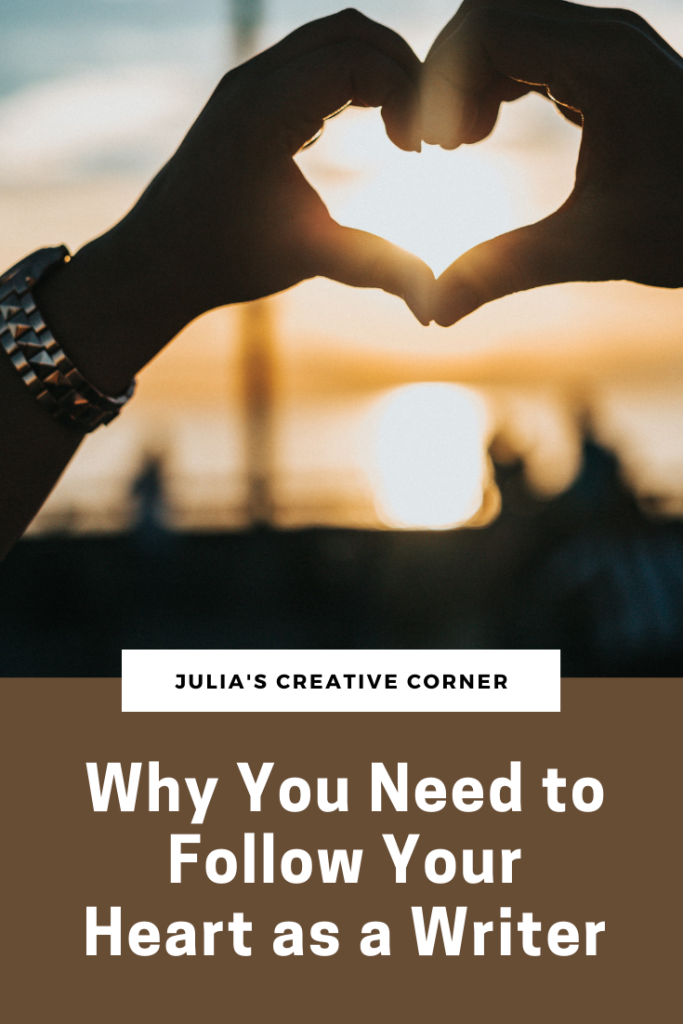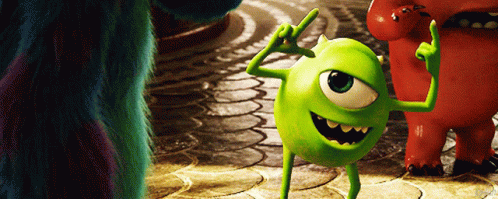And we’re back with the third post in this series! 😃 If you’ve missed any so far, make sure to check them out.
Recap:
Why You Need to Focus on Joy in Your Writing
I have made fun of the idea of being a Disney princess and following your heart before.

Yes, I spared you a GIF of an actual Disney princess this time.
However, there is actually some merit to the idea. I mean, if so many of those girls could end up happily ever after, there’s got to be something to the idea.
Today, I’m breaking down this concept with writing in mind. I mean, it’s good and all to listen to your heart when it comes to life choices – that’s probably how you decided to become a writer in the first place. But how can you use that idea in your writing itself?

I’ll say it again: if you haven’t read the last two posts, go check them out. There’s basically prerequisites in this series. I mean, there’s a reason I put them first and all in a series together.

Done reading them?
Good. Let’s get to it, then.
What is in Your Heart?
This is probably one of the first things we should take a look at. And don’t go all science-y on me, okay? I studied the heart in science this school year already, thank you very much, and I know how it works. 😆
I’m talking about your heart emotionally. Which you probably already knew, but if I didn’t say that, my sister Mary would probably end up making some kind of joke to me about this. 😂

Anyway, think about this: the idea of the Why and finding joy in your writing essentially relies upon this concept of following your heart. But so does pretty much everything else in your writing as well.
Let me explain.
Genre
Here’s a biggie: the very genre you write in. You likely will gravitate to what you like to read because you like it. Because you like it, you will write in it. And the genre can change the kind of story you write entirely and experience you want to leave your reader with.
Your Characters
What are your characters like? Most likely, there are going to parts of them that you personally really like. Unless they’re the villain, in which case it will be something that you really don’t like.
Personally, I love sarcastic characters and lots of banter – so guess what ends up in my writing? 😆

What Happens
Known more commonly as plot, the idea of what happens is very much affected by what is in your heart. For example, I love coffee. It has a very special place in my heart. 😜

Coffee ends up in my stories a lot. (Actually, now that I think about it, it’s been in almost every single one. 🤔)
The idea of coffee doesn’t sound very big, but take a little bit of a closer look. Coffee means character development, or coffee shop scenes. In The Storm Inside, a big part of Amanda’s character was the fact that she was a coffee lover. In my two manuscripts from the beginning of 2020, there were scenes where the characters went to drink coffee. They bonded during the scene, and we got to see more of their personalities: who liked super sweet drinks with ridiculous amounts of sugar to the point where it doesn’t even resemble coffee anymore, and those who like it plain. And then in my NaNoWriMo 2020 novel – whose name I still haven’t announced – one of my characters was literally a barista. Coffee had a huge impact on the whole book.
Singing also ends up in my books, because I’m a singer myself. So do books, since I’m a reader.
Writing about something you are fascinated with can really give your book a unique taste of you. It doesn’t even have to be something you know that much about – like how I wrote about the ocean in my NaNoWriMo 2020 novel – or something you know probably way too much about.
But you probably get the idea about my point here. What you like, what you enjoy, can influence your book a lot.
Following Your Heart

The next step, of course, is to actually follow what is in your heart.
Your Why
This is probably one of the largest things that will be affected in your writing. Your Why is something that matters to you – and something you know all about if you read my post on it. You did read it, right? If it matters to you, that’s in your heart. And really, to find out what your Why is, you have to listen to yourself. What is something that you wish you could tell the world? What makes your heart ache and you wish you could fix? What is something very dear to you that you had to work hard to learn?
Your Why transforms your entire story. Make sure to really write in one that matters to you.
Joy
What will bring you joy?
What would you love to see your characters do? (Like drinking coffee, for instance, or reading books.)
What do you want to write about?
If you think about your book, these answers will come to you. Every writer is different, so I can’t determine for you what this will be or how it will work. But I personally get a random feelings/visuals kind of floating around in my head with no explanation – or else some ultra-specific scenes with every detail included. 🤨 But those are my bedrock that I build off of. When you are making your book, you usually take these organic ideas that have come to you and kind of build the rest of your book on top. They are the mood, the feeling, the vibe of it all. They tend to determine genre, what your characters are like, and where things are going to go. Or else they’re just a totally unhelpful collection of random ideas you have to somehow string together. *looks pointedly at my story ideas*

Your Gut
The concept of following your heart really is also related to the idea of listening to your gut. I think that we don’t give our intuition enough credit; a lot of the time, I decide on character names simply based on what my gut says about it; how I feel about it.
If you’ve been into writing stories for a while, then I think you really can develop an on-point writerly intuition that you can trust. I’ve seen writers write stories with pretty much no outline and still come out the other end with a story that has a lot of the story beats you’ll find in the 3-Act Story Structure. It’s just this subconscious, intuitive thing that can happen.
Trust yourself.
Writing Like a Kid
I was going to make this a whole post of itself, but really, if I did, I’d just mostly be reiterating what I’ve already said. So, I’m placing this in here as a section.

If you struggle with actually doing this – choosing joy and following your heart in your writing – but just don’t get how to do it, then think about it this way:
Remember how you used to write when you first began. You may or may not have been a kid at the time you started, but think about a kid. They jump from one thing to another, deciding I want to do that and then simply doing it. They don’t always think about what could go wrong or if it is the right thing to be doing right now; they just do it because they want to.
And, most likely, when you began writing, you just wrote whatever you want. I know I certainly was a pantser when I first started. I would just sit down and write when I felt like it, putting in whatever I felt like.
Last year, I kind of went back to my roots with my March manuscript. I had ideas for scenes, but with no particular order in mind. Every time I sat down to write, I just chose whichever one I wanted to write, and the characters developed as the story went along through those scenes.
Sometimes, it’s really good to just forget about all the technicalities of writing and try to just find that fun in it again. I myself am still working on how to find a healthy balance between getting work done, but also being able to do it when I want and what I want. So, I’m not at all saying to forget all the ideas you have about building a habit or being able to work through the boring parts of writing; those are still highly necessary. But it’s good to have balance.

Your Prime Writing Time
So far, my best recommendation to be able to do this is one that brings back a post I wrote quite a while back: my post on your writing time from my Things I’ve Learned from NaNoWriMo series. I had just successfully completed my first NaNoWriMo ever, and made a giant series on everything I learned from it. This post in particular deals with the idea that you write at the best time for you.
While I wouldn’t say that post is some of my best quality, it does make a good point. When you find the time you like to write at the best, then you can create a habit of writing every day, but do it at the time when you’re most creative.
Essentially, your prime writing time is just the time you feel most creative and can get the most done – with the least amount of effort involved. I mean, if you wrote at midnight and you hate writing at night, you’re going to struggle for multiple reasons: exhaustion, bright screen in the dark, and the fact that you hate writing at night, of course. Now, compare that to writing in, say, late afternoon. Maybe you like the way there’s sunshine, or how you’re finally feeling awake – or perhaps winding down now. And, of course, that it’s not night. 😆 You’d probably get a lot more done at that time.
Applying that to a writer, the idea is to find what time works best for you to create (while keeping health in mind, of course; don’t write at midnight, folks.) For me personally, my creative juices really get flowing mid afternoon. It’s when I’m basically peaking in my day and can get the most done. In the morning, I’m slower, as I’m trying to wake up, and in the evening, I’m tired from a long day. But you might like writing early in the morning best because no one is bothering you and everything is just waking up; I have no idea. Try out different times, and see what works for you.
It’s easier to write at a time you write best at, because then you’ll feel like writing, but will also be able to be consistent about how often you write and when you do it (building a habit), rather than getting up in the dead of night to write because inspiration finally decided to strike. Not that *cough* I’ve ever done that before, or anything.


The posts so far in this series have been setting us up for the ones coming up. If you noticed the name – Every Writer is Different – then you’ll probably be noticing a theme by now. I’m trying to help you find a way to claim your own unique abilities and perspective as a person in your writing. I can’t teach you how to write like you can, but hopefully these are helping to guide you to doing that yourself. 😊 Next post, we’ll be moving into some pretty interesting topics. 😉
If you enjoyed this post, you might also like:
Why Writers Never Get Instant Gratification
How to Brainstorm Your Story in 5 Steps
Putting on Blinders and Blocking out the World
Next post, we’ll be diving into a topic that’s one many writers wonder about. I won’t spoil anything, but of course, you can just remember that this whole series is about helping you unlock your own unique potential as a writer. 😉 You’ll want to make sure to subscribe so you don’t miss that! 😃

What do you think of this series so far?
What did you used to write like?
How often do you write what and when you want to?
-Julia

❤
LikeLiked by 2 people
I started writing at the very young age of 25, winged the first draft completely while having no idea what I’m doing, and had a lot of fun. It was like letting my inner child out again, after being held on a tight leash a long time. I just took a bunch of random ideas, and a ton of stuff I liked as inspiration, and managed to turn it into a story that was, by a great deal, based on what I like in my prefered genre (fantasy).
In quite unspecific way, the best time for me to write is when I’m alone – as long as it’s not night, of course, I prefer a good night’s sleep. Longer sessions work best for me, so I often write on Sundays from morning to around noon.
LikeLiked by 2 people
That sounds pretty awesome 😃
Haha, yes, night time is the one time I try to not write. 😆 Weekends are a great time to get a lot of work done for sure 😃
LikeLiked by 2 people
Julia, this is an AMAZING series! This has helped me so much, especially since I’ve been doubting myself a TON. But this post came out and gave me the hope and courage to keep writing today. Thank you very much for what you do! ❤
LikeLiked by 2 people
Thank you!! 😄 I’m so glad that you like this series! It really is dealing with some hard-learned lessons of mine, so I’m really glad to share them and see that they’re helpful to others. 😊 Keep going; you’ve got this 😃
LikeLiked by 2 people